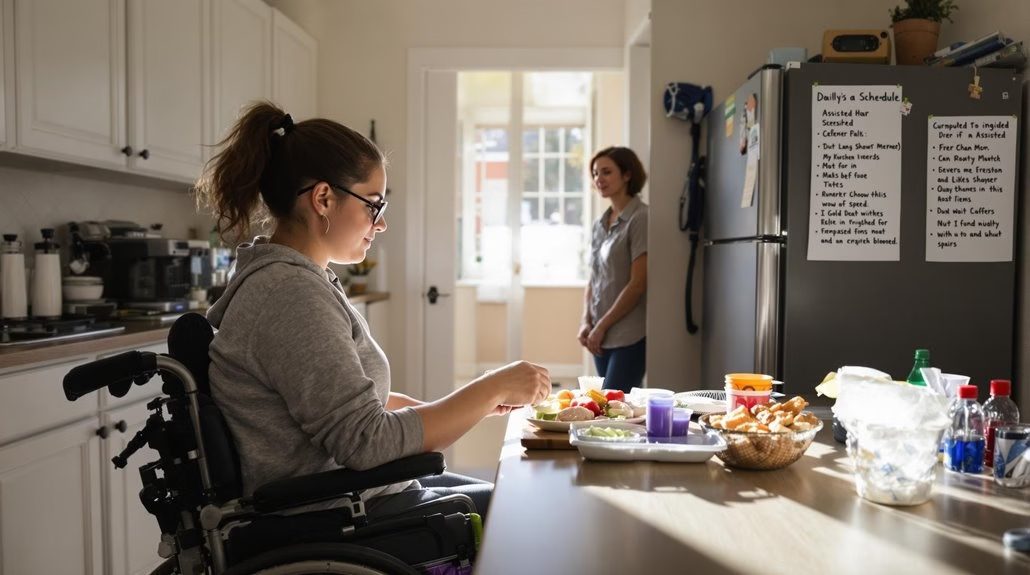Respiratory complications like pneumonia and aspiration are the leading causes of death in cerebral palsy. You’ll find that breathing difficulties often arise from muscle weakness and poor coordination, which can make swallowing challenging and increase infection risks. While mild CP may not greatly impact life expectancy, severe cases require careful monitoring of respiratory health. With proper medical care, nutrition, and prevention strategies, you can better understand how to manage these critical health risks.
Understanding Life Expectancy With Cerebral Palsy
While cerebral palsy (CP) isn’t typically life-threatening on its own, the condition can impact life expectancy depending on its severity and associated complications.
If you’re caring for someone with mild CP who can walk independently and has normal cognitive development, they’ll likely have a life expectancy close to the general population.
However, more severe cases involving multiple disabilities may reduce life expectancy, particularly when combined with respiratory problems, seizures, or feeding difficulties.
Severe cerebral palsy combined with breathing issues, seizures, or eating problems can significantly impact how long someone may live.
You’ll want to focus on maintaining your loved one’s emotional well being while managing these challenges. Regular medical care, proper nutrition, and physical therapy can greatly improve quality of life and longevity.
Working closely with healthcare providers to address complications early will help guarantee the best possible outcomes for those in your care.
Organizations like Focus Family Care provide comprehensive support services to help individuals with CP navigate healthcare challenges and maintain independence.
Respiratory Complications as Primary Health Risks
Respiratory complications represent the leading cause of death among people with cerebral palsy. If you’re caring for someone with CP, it’s vital to understand that their breathing difficulties often stem from muscle weakness, poor coordination, and difficulty swallowing.
These challenges can lead to serious respiratory infections when food or liquids enter the lungs instead of the stomach. Proper airway management becomes essential, especially during meals or when the person is lying down.
You’ll need to watch for warning signs like coughing during meals, chest congestion, or labored breathing.
Working with healthcare providers to develop an effective treatment plan can help prevent these complications. This might include positioning techniques, breathing exercises, and specialized feeding strategies to protect your loved one’s respiratory health. Home health care services can provide skilled nursing care and specialized assistance to help manage respiratory risks in a comfortable home setting.
Preventing Aspiration and Pneumonia
Since aspiration and pneumonia pose serious risks for people with cerebral palsy, implementing proper preventive measures is crucial.
You’ll need to focus on aspiration prevention by making sure proper positioning during meals, using thickened liquids when necessary, and maintaining good oral hygiene.
For effective pneumonia management, you should guarantee your loved one receives all recommended vaccinations, including the annual flu shot and pneumococcal vaccine.
You’ll want to work with a speech therapist to develop safe swallowing techniques and learn proper feeding positions.
Keep the head of the bed elevated at least 30 degrees during meals and for an hour afterward.
Regular chest physiotherapy and breathing exercises can help clear airways and strengthen respiratory muscles.
You should also monitor for early signs of respiratory infection and seek immediate medical attention when needed.
Consider working with skilled home care professionals who can provide specialized nursing support and therapy services to ensure proper care techniques are consistently followed.
Additional Medical Conditions That Impact Survival
Beyond respiratory challenges, several other medical conditions can greatly affect life expectancy in people with cerebral palsy.
Understanding these additional health concerns will help you provide better care and support for your loved one with CP.
- Seizure disorders can greatly impact survival rates, especially when seizures are frequent or poorly controlled with medication.
- Orthopedic issues like scoliosis and hip displacement may restrict breathing and increase the risk of complications.
- Gastrointestinal problems, including difficulty swallowing and reflux, can lead to malnutrition and increased aspiration risk.
- Cardiovascular complications often develop over time, particularly in individuals with limited mobility.
Working with trained caregivers who specialize in mobility support and fall prevention can help reduce complications from these conditions.
Modern Treatment Approaches and Survival Rates
Thanks to significant medical advances over the past few decades, people with cerebral palsy are living longer and healthier lives than ever before.
Modern therapeutic advancements have dramatically improved both life expectancy and quality of life for individuals with CP.
You’ll find that early interventions, including physical therapy, occupational therapy, and speech therapy, play an essential role in managing symptoms and preventing complications.
Today’s treatment approaches often combine traditional therapies with innovative technologies like robotic-assisted gait training and virtual reality rehabilitation.
The survival rate for children with mild to moderate CP now approaches that of the general population.
Even those with more severe forms of CP are experiencing better outcomes through extensive care plans that address respiratory health, nutrition, and mobility needs.
Home health physical therapy offers personalized rehabilitation plans focused on mobility, pain relief, and fall prevention while allowing patients to recover in their own homes.
Support Systems and Quality Care Management
While medical treatments form the foundation of CP care, extensive support systems and quality care management are equally essential for long-term success.
You’ll need to coordinate multiple services and support networks to guarantee all-encompassing care for your loved one with CP.
- Build a strong healthcare team including physicians, therapists, and specialists who communicate effectively with each other
- Establish reliable caregiver support networks to prevent burnout and guarantee consistent care quality
- Maintain active family involvement in treatment decisions and daily care routines
- Connect with CP support groups and community resources for shared experiences and advice
Remember that quality care management involves regularly reviewing and adjusting care plans as needs change.
When you prioritize building these support systems, you’re better equipped to provide top-notch care while maintaining your own well-being.
Conclusion
Living with cerebral palsy means keeping a close eye on breathing and lung health, since these problems are the main health concern for people with CP. Think of your lungs like a garden that needs daily care and attention. Just like Sarah, who stays healthy by doing her breathing exercises every day and working with her doctors, you too can take steps to protect your health.
Taking good care of yourself isn’t something you have to figure out alone. Simple actions like doing breathing exercises, seeing your doctor regularly, and being careful while eating can make a big difference in your daily life and overall health. These habits are like building blocks that help create a stronger, healthier future.
Remember, you’re part of a caring community that understands what you’re going through. Many families face similar challenges, and there’s always help available. Focus Family Care‘s team of experienced caregivers is ready to support you every step of the way.
If you or a loved one need help, don’t wait. Reach out to Focus Family Care today at (561) 693-1311 or email us at info@focusfamilycare.com.





